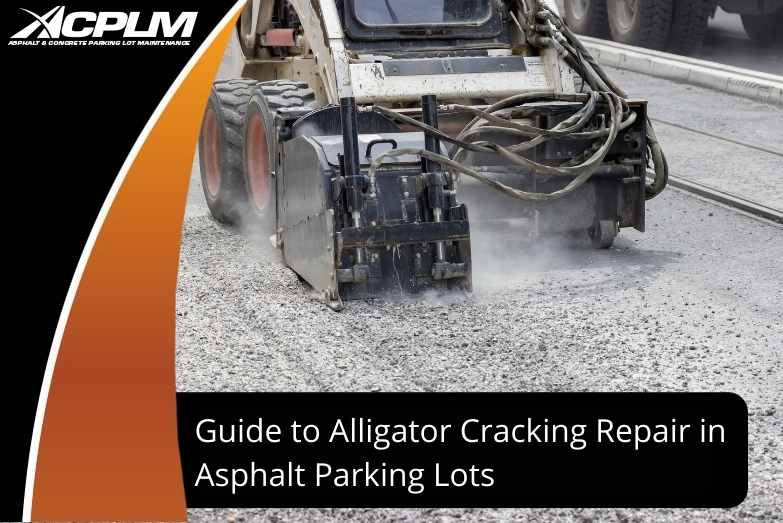
Learn the common signs of pavement failure in asphalt parking lots.
Recognizing pavement failure enables you to understand when you need to seek the services of a Paving Contractor, and to know what type of services you need. Thankfully, the common signs of asphalt material failure are easy to recognize once you know what to look for.
Asphalt Pavement Cracking
Regardless of the type of crack present, or its severity, asphalt cracking requires an immediate solution. Cracks of any kind make your pavement more susceptible to water ingress, harmful road chemicals, and UV light rays. Asphalt cracking also causes asphalt to dry out and can result in even more cracking. Most forms of cracking come as a result of wear and tear, such as fatigue cracks or transverse cracking. However, in some cases, cracks like edge or block cracking can occur due to poor asphalt installation.
Potholes
Potholes occur because of extensive water erosion, where water has been allowed to collect in any cracks or void spaces. Over time, the water will erode all the way down to the sub-base, resulting in damage that can no longer be repaired or patched. If potholes go this deep, the only proper solution is seeking replacement of the entire affected area in order to avoid continued compaction.
Standing Water
When an asphalt parking lot is first installed, water drainage is an important consideration for the design of the lot. A properly maintained parking lot should have a minimal amount of standing water after rain. If you spot noticeable puddles, there is a good chance your parking lot is suffering from excessive compaction issues where the material has become concave over time. The underlying layers of your asphalt are uneven and creating height differences that are expediting pavement failure.
Asphalt Raveling and Fading
If your asphalt seems to accumulate small rocks and bits of black material all of the time, it’s very likely you’re experiencing asphalt raveling. The term refers to the steady deterioration of asphalt. Asphalt is a collection of chemically bonded aggregates. As it loses proper bonding, it will begin to come apart, resulting in the loosening of the topmost material.
Raveling can occur for a variety of reasons, many of which can be remedied with asphalt repair. The more common causes include:
- A poor asphalt installation where proper compaction was not achieved
- Unrepaired cracks and fading are leading to water intrusion, which is wearing down the asphalt bonds
- Very high amounts of traffic, which leads to raveling through simple wear and tear
Raveling is among the most common types of pavement failure and much of the time isn’t too concerning. However, it can’t be ignored, because raveling quickly leads to extensive cracking and potholes.
Freshly installed asphalt pavement should be a deep, black color. Over time, the material tends to lose this coloration and will begin to grey. This happens because the UV radiation present in sunlight has a negative impact on bitumen, forcing asphalt to lose elasticity and speeding oxidation. To prevent fading, cracking, and other common forms of pavement failure, it’s highly recommended that sealcoating be applied to your parking lot.
Contact ACPLM for Asphalt Repair in Tampa
Whether you need pavement repair, sealcoating, or you’re looking for professional parking lot installation, you can trust the professionals at ACPLM. We’ve provided comprehensive asphalt repair and maintenance for decades and take great pride in offering superior services and customized solutions to our customers.
Learn more about the signs of pavement failure by contacting ACPLM today, or call for a quote for your asphalt repair!






